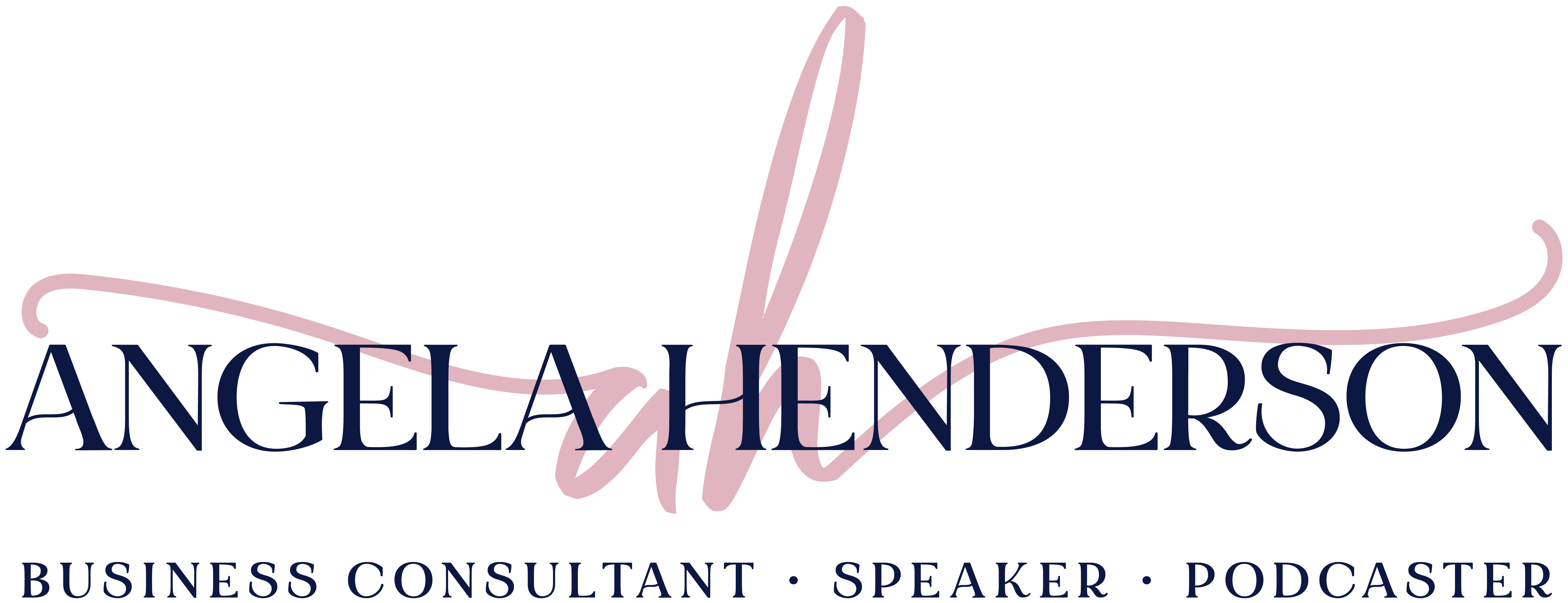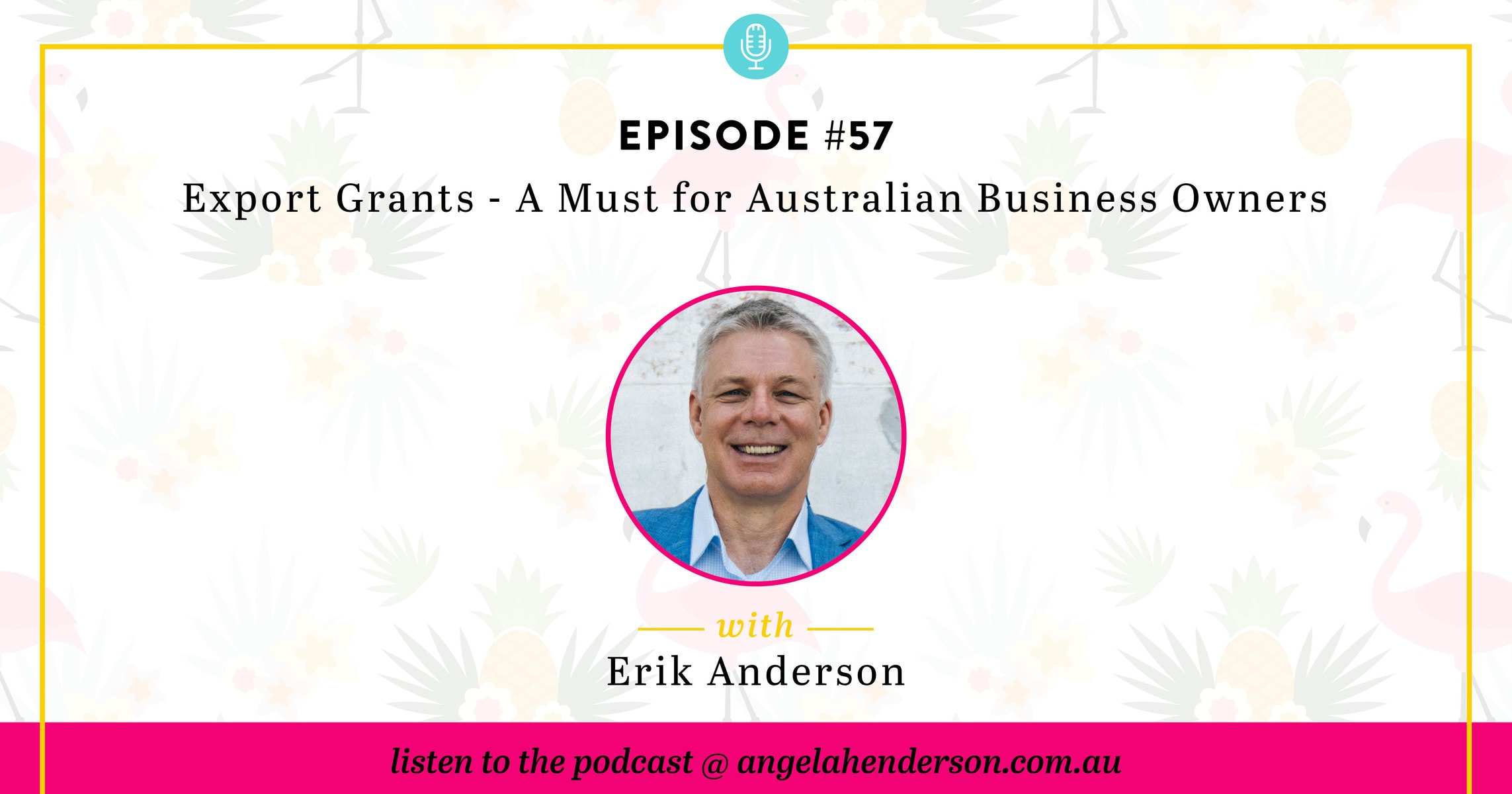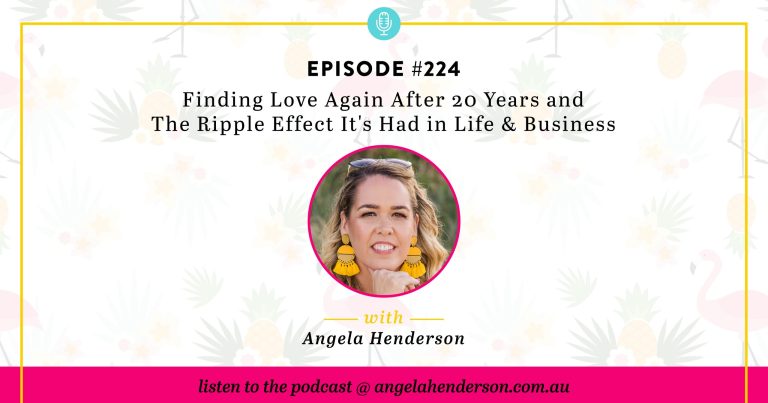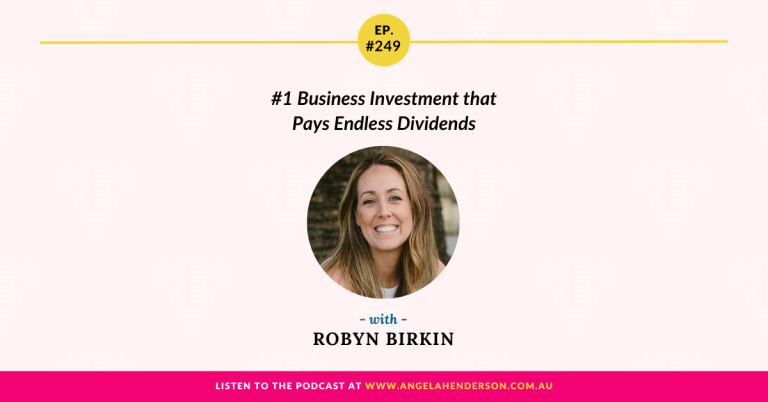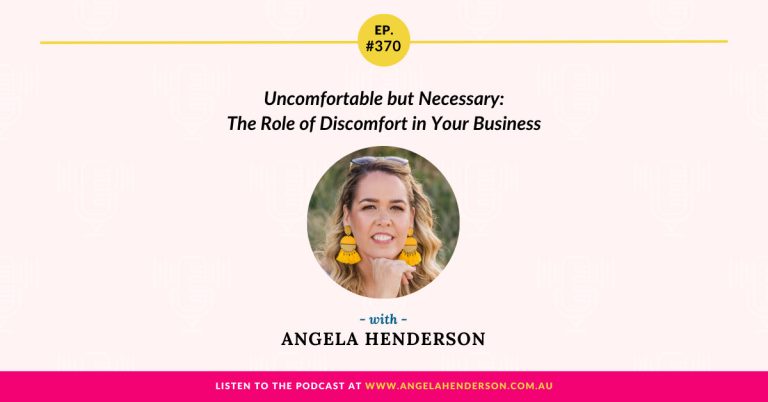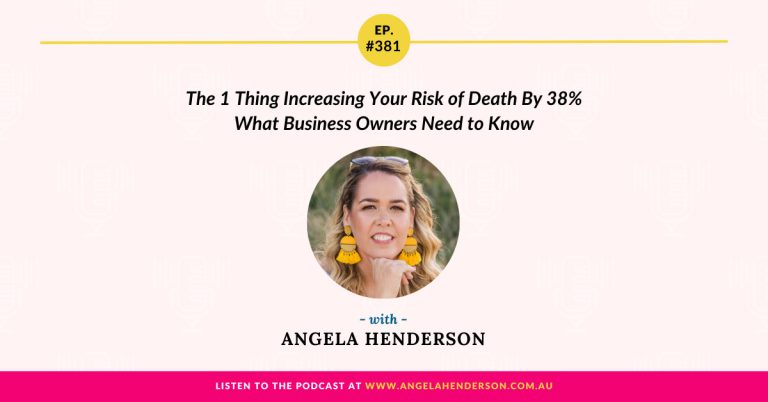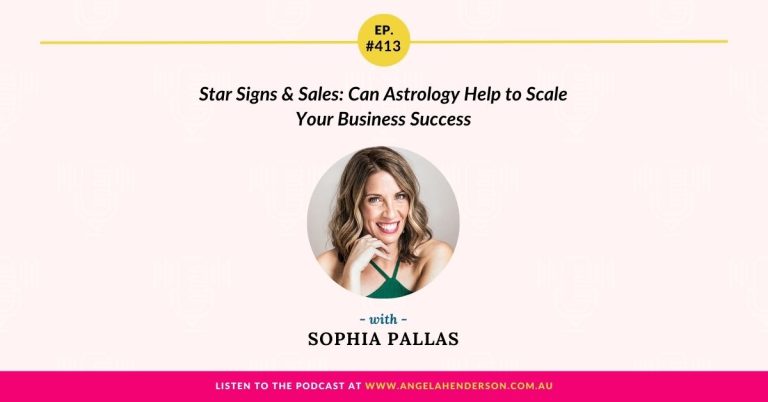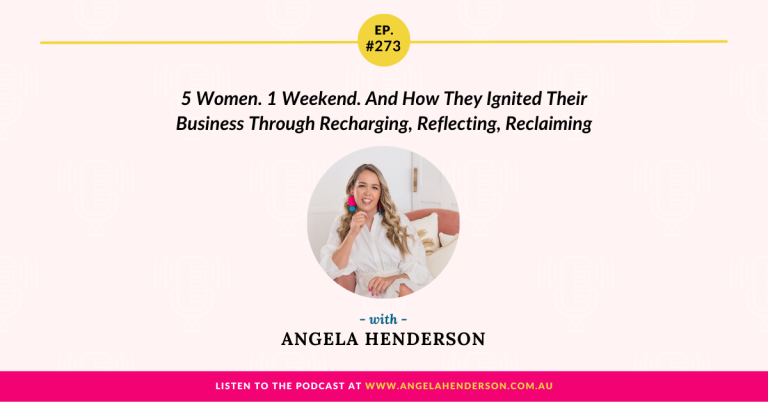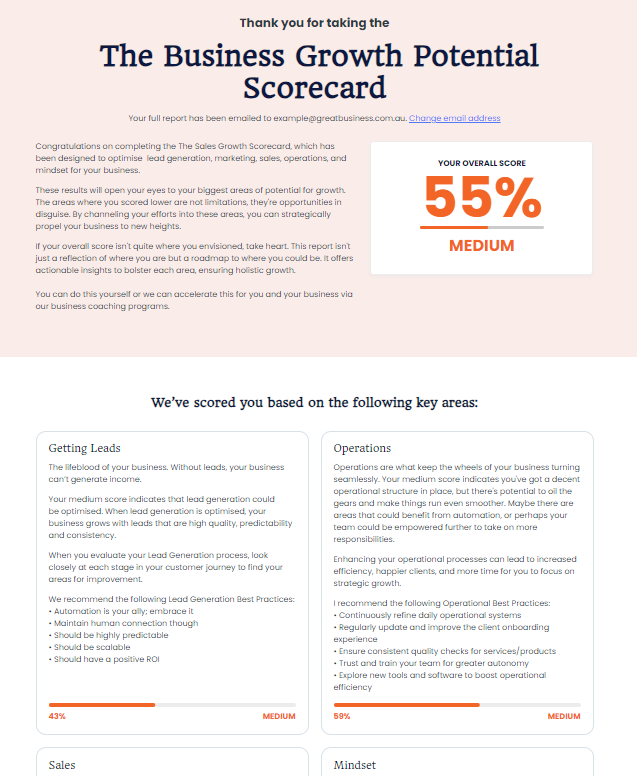Get ready to listen to the mind-blowing Episode 57 of the Business & Life Conversations Podcast with our guest, Erik Anderson of Grant Central. Erik will be talking all about the Export Market Development Grant offered to businesses by the Australian Government. He will be touching on many topics such as the kinds of grants you can possibly get, eligible and non-eligible claims, when you can apply, who can apply for it, and so much more. This is an episode you should definitely listen to because you might not know it but you can be eligible for the grant yourself and potentially save you thousands of dollars in marketing spend.
Important Links Mentioned in the Show:
Australian Business Collaborative Facebook Group
Finding Balance in Business Women’s Retreat
Angela Henderson Active Business Facebook Group
Angela Henderson Facebook Business Page
Prefer to read Export Grants – A Must for Australian Business Owners? Here’s the transcript:
ANGELA:
You’re listening to the Business and Life Conversations Podcast with Angela Henderson, Episode 57.
Hey there, you’re listening to the Business and Life Conversations Podcast. My name is Angela Henderson and on this show, we talk about improving your business, life or both. By having amazing and rich conversations with brilliant guests who will inspire you and who will give you tips and tricks to help you grow both in life and in business.
Well, hey there, and welcome back to another episode of the Business and Life Conversations Podcast. I’m your host, Angela, from Angela Henderson Consulting, where I’m a business consultant helping women in business to develop the foundational framework they need to grow sustainable and profitable businesses. And I do that by helping women gain clarity, strategy and also having access to a beautiful community. I hope you’re ready to be mind-blown with this episode just as I was when I first heard about the Export Grant. Because it could potentially change your entire business. I don’t say that lightly. So please, please, let me explain.
In this episode, I’m going to be bringing on an amazing man by the name of Erik Anderson, from Grant Central, who I am privileged to be able to call a friend of mine. He’s going to talk to you about the Export Grant. Now, before you shut this episode off because you think this episode doesn’t apply to your business, I want to make it very, very, very, clear that this is an episode you will want to listen to. I, too, thought, I didn’t qualify for the Export Grant because I’m currently a service-based business only with Angela Henderson Consulting. And Erik advised that I was wrong. And that I clearly am eligible to apply for this particular mind-blowing grant that is not spoken about enough here in Australia.
So for those of you out there that are Australian business owners, I just want you to know that the Export Grant is an assistant program administered by Austrade and is available to help both e-commerce and service-based businesses promote their products overseas. And during this episode, you’re going to learn what is the Export Grant, what are the eligibility criteria, how you can apply with this grant and how many times you can apply for it, and so much more valuable information. I’m telling you, you will want to listen because as I mentioned earlier, it could potentially change your entire business. So far that in my time of even knowing about the Export Grant, I’ve probably referred to Erik 10 other businesses who were servicing people in America, servicing people over in the UK, spending tens of thousands of dollars, to now understand that they, too, can apply for the Export Grant and get copious amounts of money back. So please stay tuned for this amazing episode.
But before we jump into this episode, I just want to let you know that this episode is sponsored by my 4-day, 3-night Exclusive Women in Business Retreat where we will be focusing on women having the chance to connect, refocus, learn, and grow. This event is going to be held from October 24th through to October 27th, at the Gold Coast here in sunny Queensland, Australia; and it’s an exclusive event with only 50 tickets being sold in order to ensure it is intimate and businesses get exactly what they need for growth. From having 8 of Australia’s top female entrepreneurs speaking, to surrounding yourself with amazing people that will lift you both up at the conference and after conference, to daily masterminds to get individual help on your businesses from both your peers and the speakers, to amazing food, being able to sleep in, and eat a meal uninterrupted by your children; you’re not going to want to miss this amazing Retreat. To learn more about this Retreat, and to purchase your ticket today, head to angelahenderson.com.au and simply click on Retreat.
Alright. Let’s get in to this epic episode. Welcome to the show, Erik.
ERIK:
Thank you very much, Angela, for having me.
ANGELA:
Gosh. Well, thank you so much for being on board. I know you’re a busy man in the middle of this current, crazy, financial year-ending type season. So thank you for having the time to come on board today to talk about the good, old Export Grant.
ERIK:
No problem. Looking forward to sharing it with your listeners.
ANGELA:
Yes. And then listen, I was trying to think back as I do with all my guests when we first met. And I know we briefly had an encounter at ProBlogger; it was like in passing like, “Hi. How are you?” But we didn’t actually really; because ProBlogger is an amazing event and actually Darren Rowse is bringing that back to Melbourne this year; end of August, I believe. I saw tickets are about to go on sale. So for those of you wanting a really great event in Australia, that is a great event to attend to. And it’s going to be almost two years since we initially met and then our paths; it’s funny, we just continue to cross paths on a regular basis at other events that we attended. And then, we happened to be in James Schramko’s membership together.
ERIK:
That’s right.
ANGELA:
And whenever we get together, we always have a good belly laugh; we always have a good conversation. So I knew I had to get you on the podcast to have a chat because there’s so much information you have about something so many Australians, in particular; because that’s where we’re at, don’t know about. And again, what I think people are missing out on is an enormous amount of potential injection of cash flow back into their business because of this amazing thing called the Market Development Grant. So yes, that’s why we have you here.
But Erik, I’m going to throw a span in the works. I know we’ve talked about what questions we’re going to have. But before we dig into the nitty-gritty about the Export Grant, I always like to ask my guest a question that I don’t let you guys know about. Because I think it’s important that the listeners get to know you; a little bit about who you are. And I know through our relationship over the last couple of years; there’s one thing that I really honed in on and you love hotels. But not just any hotel, Erik.
ERIK:
Yes. When I travel, I like to spend a bit of money on some decent hotels. So I’m only; not the most expensive hotels, but I do like to go and spend a little bit more money on the; not the most expensive but the reasonably looked-after hotels. Because when you travel and you’ve got meetings, nothing that beats a good night’s rest.
ANGELA:
A good night’s rest but also just to make life easier. Like if you’re jetlagged, like you want good internet, you want to be able to access food. Especially if you’re a; like I know people who will literally touch down in the US or Canada who are there for 72 hours and leave, like you want things at your fingertips. So my question to you is, you’ve done a lot of travel in your time. What is your most favourite hotel? That’s my question for you and why?
ERIK:
I suppose the hotel that I go and spend the most time in when I’m in Sydney is the Westin Hotel, right in the middle of Sydney. I just love the hotel. It’s so close to all the transport options, good restaurants. Most of my clients are in the CBD, so it’s easy to walk to their offices. And it’s a great hotel, with so much history, and good food, and just love it.
ANGELA:
The Westin in downtown Sydney is your go-to.
ERIK:
Yes.
ANGELA:
Alright, then. That’s good. So any of you heading to Sydney, listen to Erik’s advice. That’s great; we know about the hotels. But tell those listeners, because again, not a lot of; I’m still new to the whole podcast thing. Well, actually, we’re about to hit our year-episode, which is kind of exciting. But the time this goes live, we’ve already hit a year. So I batch my episodes ahead of time. So we will have a year-show going in advance, which is amazing. So not all my listeners will be very familiar with my guests. So I also just want you to give us a brief little background about who you are, Erik, and what you currently do. And then will hop into this particular episode.
ERIK:
Yes. So, I’ve been in Australia for 17 years. I was born in South Africa to Swedish parents. So I can talk Swedish and English and a couple of other languages that I’ve learned over the years.
ANGELA:
Well, that’s fun. I didn’t know that. That’s a cool fact to know.
ERIK:
So I’m an accountant by training. And when I came to Australia, I started looking for accounting jobs; met a person who was doing grants, government grants; did some contract work with him; just enjoyed meeting people from a whole range of industries and enjoyed the fact that I could do work and then I could get money from the government. As an accountant, when you’re dealing with clients, typically, you’re helping them pay the taxman or things like these. Where this is the other way around; where I was helping clients get money. And so I’ve been doing this for the last 17 years and really enjoy working with a whole range of different clients across many industries and just getting to know a little bit more about what they do.
ANGELA:
Fantastic. And listen, you are really a conversation starter. I see it at so many events that we attend together. And that’s what I love about you, is you’re always really interested about what other people are doing. And also, that’s I guess where your expertise comes in, because I know, initially you said when we first met, you’re like, “Oh, Anj, have ever heard about this Export Market Development Grant?” And I was like, “Nah, what are you talking about?” Like I never qualify for anything. And you’re like, “Do you service people out of Australia? Or do you advertise on Australians?” And I was like, “Yes.” And you were like, “We need to talk.” And I was like, “Hold on a minute. Why is this shit like top-secret?” I was like, “This should not be top-secret.”
So, yes. You’re about to help me with my own Export Grant at the end of this financial year, which is super exciting. But for those of you listening and you’re kind of like, “Alright, you two. Stop with this top-secret stuff. What is in on it?” Tell us what the Export; I call it the Export Grant, but the real name or the definition name I think is called the Export Market Development Grant. Is that correct?
ERIK:
Yes. That’s correct. So the Export Grant, just to give it a short title, has been around for over 44 years in Australia. It was initially, particularly by the federal government, to assist Australian-based businesses with the high expenses of trying to get their products over into the rest of the world. Because, you can imagine, in the ‘70s and ‘80s of going to a trade show, just telling people about the products was very expensive. And the government put together this program to assist Australian companies to subsidize some of their marketing costs in going overseas.
Over the years, it’s changed quite a bit. One of the most recent changes that’s been around for just over 10 years is the ability for Australian-based companies to have their products, Australian-developed products; manufactured off-shore, typically in China, and for it still to be considered an export; eligible for the Export Grant.
ANGELA:
Perfect and amazing. And so, Erik, why do you think so many businesses, like I, I consider myself pretty cluey. I go to an enormous amount of events here in Australia and international, and like again, I was dumbfounded when you told me about this grant. Why do you think it’s something that, there’s not a lot of attention and a lot of, I guess, hype about? Because I think so many business owners would kind of struggle with that cash injection, especially when you’re starting out and you want to break into the international market. Why do you think it’s not spoken about as often?
ERIK:
Well, I think, at this popular size, I think a lot of people in the digital marketing space like yourself, and others that we worked with, don’t consider themselves to be exporters. Any business that gets foreign money into their bank account i.e. from America, UK, China; anything, anywhere, except for New Zealand; New Zealand isn’t counted as an export country; but the rest of the world, anybody who invoice and receive money into Australia is an exporter. And that’s where this Export Market Development Grant is there to assist you with promoting your products and services overseas to get more money into Australia for foreign exchange.
ANGELA:
Gosh. I’m sure for those of you that are like falling off your chairs, not really like, I’ll just give you a minute to pick yourself up, because you’re probably thinking there, like I was, “This is too good to be true. This is like some kind of scam.” This isn’t. Erik said this has been in Australia for 44 years. Erik has done what; hundreds, thousands of these applications over your time.
ERIK:
Coming to a thousand. We should hit a thousand applications in the next couple of years.
ANGELA:
I mean, and you have, I mean recovered is not the right word. But you’ve been able to bring back to small businesses, medium-sized businesses an enormous amount of money that people just weren’t even expecting. So now that people, I guess, know about this grant; is it a grant or can you talk us a little bit more like do you need to spend the money first before you can apply for the grant? Or do they give you the grant and then you get to spend the money? Like how does that work?
ERIK:
So there are two different types of grants that we look at. One is called reimbursive; so you spend the money first and then you get some of it back. And that’s really the Export Grant and another program called the R&D Tax Incentive. Those are the two pedigrees of grants that fall into that pedigree of reimbursive; spend money first and then you get some of it back if you meet the criteria. The other type of grant is called a competitive grant; so this is a grant where you put it in an application, it will go to a committee, a committee will look at all the applications; and depending on how much money is in the budget, we’ll then allocate the money to deserving applicants. We look at those grants as well, but the purposes of this discussion, we look at the Export Market Development Grant, which is a reimbursive grant.
ANGELA:
Reimbursive grant. And for those that are kind of wondering, “Okay, Anj, she’s a digital marketer versus like say an e-commerce product-based business,” what are some of the main areas; like what could people claim, potentially? Like, I know every individual business is going to be very different and that’s why it will be important for them to talk to specifically. But kind of just like in for conversation purposes, what are some of the main areas that businesses could claim in?
ERIK:
Yes. So most businesses are able to claim a lot of the same type of expenditure. It varies from industry to industry and business to business. But typically, we’ll just run through it. So the major area that people claim under is what’s called overseas marketing trips. This is where you go to, let’s say, you example, you might go to Social Media Marketing World to go and find new clients to take your products. And the cost of flying over to the US, the cost of attending Social Media Marketing World, as an example; and then, for meals, accommodation and taxis and Uber, you’ll get in a daily allowance of $350 a day.
ANGELA:
Unbelievable.
ERIK:
For a day that you spent marketly. Now, how it works is that, then you would add up all those expenses. So that might come to $15,000; $15,000, you take off $5,000, which gives you $10,000, and you’ll get 50 cents and a dollar back. So you would get then back $5,000.
ANGELA:
Yes.
ERIK:
The other expenses, which are added to that $15,000 that I was talking about, and one which has changed the Export Grant totally over the last couple of years, is you can claim the cost of advertising via Facebook, Google, Instagram, LinkedIn; all those marketing spend that’s directed to clients, customers outside of Australia and New Zealand. So for example, if you’re doing a Facebook campaign, and you’re targeting only the US, you’ll be able to claim 100% of those expenses. If you are doing a global advertising campaign, which would mix in Australia and New Zealand, they get a bit more complicated. In that case, we then have to go and have a look at the hits on your website and work out a percentage of Australia and New Zealand versus the rest of the world. I always say to clients, if you’re going to do a Facebook marketing, advertising on Google, just geotarget to the rest of the world, it makes it a whole lot easier.
ANGELA:
So much easier.
ERIK:
One of the other areas is, if for example, you have somebody based in the US to go and market your product and services, we can claim their expenses. If you are having a market research consultant to go and have a look at how big the market is, and we can claim their costs as well. I’ve mentioned earlier, on going to trade shows; so you might go to conferences or you might go to a trade show, have a booth there; all the costs of putting the booth together – electricity, the cost of the stand; all those expenses are add up over time. All of those expenses can be claimed as well.
If you’re in the physical goods, top of industry; the cost of sending samples over to a potential buyer can be claimed. In that case, what you look at is a manufactured cost of the product plus the transport or the Australian post cost of sending it over to somebody who’s based outside of Australia or New Zealand.
ANGELA:
And these are just like some of just many other options that people potentially could claim for. Like, if you’re making a course that’s going to be sold not only to Australians, like an 8-week coaching program like I have, and you’ve got to bring consultants on, that potentially can also be part of the Export Grant. Correct? If they’re overseas? Is that right?
ERIK:
Yes. It does become a bit grey in that specific area that you mentioned, Angela. The Export Grant have the marketing sides. So if you’re going to get people in to help you with the production of the course, that isn’t considered to be marketing, so then we’ve got to exclude those.
ANGELA:
Yes. Got you.
ERIK:
So it does get a bit technical, and that’s obviously where, having done this for 17 years, I can look at an application and quickly work out which areas are eligible and which aren’t.
ANGELA.
Which aren’t. Fantastic. So again, for those of you that are out there, and you guys are going, “Oh, I do some of that. I do some that.” Again, later on, we’ll make sure that you know how to get a hold of Eric because it is super important that you at least have conversations and ask questions to make sure to see if you’re eligible or not. Because again, many businesses aren’t aware of this.
Now, in regards to how much money does the Australian government actually put towards the Export Market Grant; do you know, Erik? Like is there an enormous amount that they put into the government?
ERIK:
So the government has put in $135 million dollars.
ANGELA:
Wow.
ERIK:
Over the last couple of years, the budget hasn’t been fully; it’s been short, underpaid, to put it this way. So the maximum grant you can get back is $150,000. You are, up to; as we speak now, you are guaranteed the first $40,000. And if your grant is over $40,000, based on how many applications there are, and how much money left in the key, you may get a percentage of the balance paid out to you. You may not get the full $150,000. The government has committed to put in an extra $20 million dollars for the next three years to help ease the situation that they currently find themselves in.
ANGELA:
But still, I mean, for business just like mine, I was like, “Alright man. I don’t even know I was going to be eligible for anything.” So any money back is going to help me out. And that’s where I guess, I think people, “Oh, I might not get the full kit and caboodle.” Man, don’t be greedy here, people. Like, embrace the fact that the government has this. Look into it and see because once you’re educated around it, you’re going to be able to make better-informed decisions about your marketing and where you position yourself for the upcoming 5 months, 6 months, or even 12 months. So things to be thinking about. Or you may have been wanting to crack into the US market or a different market, but just didn’t think you’d be eligible to be able to do that, again, this is a wonderful opportunity. You’re not going to get the money upfront, but knowing that you’re eventually going to be able to apply and get that back; I can only imagine, it would take the stress off of a variety of different businesses.
ERIK:
Yes. And we’ve seen over the years, that people have dipped their toes in, and just said, “I’m not sure if this is real.” And get their first money back from the government and then they realize, “So this works.” And then they put more and more money into their marketing spend because they know they’re going to get half of it back.
ANGELA:
Exactly. I mean, why wouldn’t you, though, right? Like, again, I know there’s always risk but it’s kind of like, you’d be silly not to. Like obviously, meet with your accountant etc. I’m not an accountant but what I’m saying is, it’s like, to me, common sense would prevail here. Now for those that; I know the things with government grants, there can also be some time frames and limits around that. Can you, or can a business apply any time during the year or only certain times during the year? Like what do you recommend to businesses?
ERIK:
Yes. So the program opens on the 1st of July. So it runs on the Australian financial year. So on the 1st of July this year 2019, you can apply for any expenses that you incurred from 1 July 2018 to 30th of June 2019. If you are a first-time applicant; and this only applies to your first application, you can actually go back two years. So if you have never applied for the Export Grant previously, we can look at any expenses overseas; marketing expenses, from the 1st of July 2017 to 30th of June 2018 plus 1st of July 2018 to the 30th of June 2019 to help smaller businesses get over the threshold; because you have to have spent $15,000 in eligible overseas marketing expenditure to be able to claim a grant. So to help smaller businesses that would allow the fact that you can put two years together to get to that $15,000 if you need it.
ANGELA:
And then, let me ask you this, because I was just; so like, say you get that money back and it goes into your account, do you have to then claim that as like, (what am I trying to ask you)…
ERIK:
As income; it is shown as income.
ANGELA:
As income. Okay yes, got you. Okay, cool.
ERIK:
It’s cash flow, assist of your cash flow. But it is seen as income in the business account.
ANGELA:
That makes sense. And from the time, say, so it’s going to go in by the end of February. And then how long do businesses normally have to wait before they would hear if their application has been accepted, rejected; what the dollar amount would be that they’re getting back? Like how does that work?
ERIK:
So if you apply in July, August, September, October even; it probably takes 6 weeks for the process to work through and for you to get notified that you’ve been successful. There are times when Austrade may phone you up or go and visit your offices just to make sure that you’re legitimate. So 6 weeks. If you wait until the very last minute, end of February, for clients who we lodge at the end of February, we are currently doing audits on those clients. So we’re looking at 3, 4, possibly even 5 months for those people to get their money back. There’s no reason why you don’t look at this and lodge it as early as possible to get the money back.
ANGELA:
I mean that, too, again, to me, is common sense. If you know there’s free money sitting there, what are you waiting here people for? Make this a priority; in my opinion.
ERIK:
Angela, if there wasn’t a deadline; there would be still some of our clients who wouldn’t lodge. So…
ANGELA:
Yes. It’s just like mind-blowing to me. Especially, again, obviously, there are trillionaires, maybe, but as a small business owner, where you take less, well, I do, anyways. I can’t speak for a lot of people. Some people have this assumption that I’ve done pretty well over the last couple of years, that people just think I roll around the money. But the reality of it is, when you’re growing and scaling your business; my family takes very little. We pay ourselves every single week. But you’re trying to scale. So you are, you’re spending things to go overseas and you’re doing all these little things that just; they take money, right? Building your team. And I know for us, you’re going to work with me at the end or beginning of July and we’re going to go back to those two years because I’ve never; we held off on doing it for that one year to keep it like the two years. So yes, I’m pumped to get that under the way. So I know you’ve spoken a little bit about it, but is there any key eligibility criteria that people need to be considering when applying for the Export Grant?
ERIK:
Yes. So probably the main thing is that you to have an ABN. That’s really the only requirement. You can be a sole trader, you can be a trust, you can be a proprietary limited company; the only requirement is you have to have an ABN. And you have to have the capacity to export. So, you can’t just decide, “Okay, I’m going to go and do a trip over to the US and go on holiday and apply for the Export Grant.” You have to be able to prove that you have a business that does is able to export if needed. You don’t have to have any sales in your first two applications. You just have to able to prove to Austrade that you have the capacity to be able to export.
ANGELA:
Yes. That sounds, again, quite reasonable expectation to be able to justify getting, again, money back from the government. And is there; I think you spoke about this just a second ago and I want to make sure that I’m clear. The minimal; like what is the minimal expenditure needed to claim the Export Grant? And does this need to be spent in the financial year? Or how does that work?
ERIK:
Yes. So you have to have spent at least $15,000 in eligible expenditure. And as I said, for a first-time applicant, that $15,000 can cover two years.
ANGELA:
Okay. Yes.
ERIK:
That’s the only time that this is allowed. Every year after you’ve done your first application, you have to spend at least 15,000 dollars in that particular year to be able to apply.
ANGELA:
Right. Perfect. That again makes sense. So $15,000 every year after, which I guess goes into my question, if people are like, “Okay, you’re talking about years after,” obviously this isn’t just a one-off Export Grant that I’m assuming people can apply for? So how many times could a business, hypothetically, apply for the Export Grant?
ERIK:
Yes. So you are able to claim 8 claims. The first application covers two years; can cover two years, and then, you’ve got 7 more applications after that. You don’t have to apply every year. So I do have some clients who will go and do the first application, and then hold off for a year because the second year, they don’t have to have any export; on second application, they don’t have to have any export sales. So they might just be strategic in how they spend their marketing dollars in the next year to try and get as much back. For the third application, you do have to have export sales, and there is a bit of a complicated formula that comes in to make sure that you are increasing your export sales every year to take advantage of the Export Grant. And if anybody wants more information, I’m happy to give them an explanation or find out on how that works. It is a bit more complicated, but for most people in those first 2 years or 2, 3 years for the first two applications, it’s something that you don’t need to bother about.
ANGELA:
Yes. And I would say the majority of listeners of mine are fairly still in the startup/have been in it for a couple of years. So I would say that most people, like I said, a bit mind-blown at the moment that this is even a possibility. So I would suspect that they’re not even at the year 3 mark, I would say. So can you; and I think you answered this; is that, you can combine the first and second year when you apply the first time, but thereafter, you just do that single year if necessary, or you said you could miss a year if you needed to. But again, you can only apply a total of 8 times in the lifespan of that particular business.
ERIK:
Yes. It does get a bit complicated. Austrade’s very aware that sometimes after people have had 8 years, they look at creative ways to stay in the program. So Austrade is aware of it. So it’s not something that you can just shut down Company A and start Company B the next day and expect to start from scratch again.
ANGELA:
Goodness. Okay. There’s always the dodgy ones. Always the dodgy ones, Erik. So then, are there any countries, and I think again, you touched on this briefly, New Zealand; but other than that, are there any countries that you can’t claim the grant for?
ERIK:
Yes. So if you are spending marketing dollars into North Korea, we can’t claim those marketing dollars. So the only country outside of New Zealand that is excluded is North Korea.
ANGELA:
Okay. That’s pretty simple.
ERIK:
I don’t think you would have any plans to have a business in North Korea.
ANGELA:
I, personally, no. And I personally don’t know if any other business that I even work that does. But I mean, you’d never know. There’s always someone out there. But I couldn’t see a huge percentage of people being in the North Korea. But anyways, you never know. There’ll always be one out there going, “I do.” So, don’t want to segregate those guys.
And how would you recommend businesses maximize their claim for the Export Grant? Because obviously, if you’re going, “Okay, well I’m sitting; I could probably get $15,000 just to kind of put the application in. But really, I have to spend a little bit more.” What are your tips for maximizing those claims?
ERIK:
Well, as you know, when we had this initial discussion, it’s often things that you might not be aware of…
ANGELA:
Yes.
ERIK:
…could be claimed. And if you structured it in different ways, it does make it eligible. I think the big one that most people don’t realize is sort of going to conferences overseas. You have to be promoting your product or service or those things. So, these are distinction between whether you’re going on a marketing trip and whether you’re going for self-educational purposes. Those are typically not eligible. But it’s often sitting with people, having a 15-minute phone call with them, getting to understand what their business is all about. And then just saying, “Oh, have you thought about this? Or if you put it this way, you might be able to claim back.” It’s giving people just the benefit of the experience that I’ve had working with hundreds of clients over the years to be able to give them ideas on where they can spend their money profitably to get some money in return. As I say, your dollar that you’re spending on marketing should return some return by itself. You shouldn’t be spending a dollar to get 50 cents back from the Export Grant.
ANGELA:
Right. Yes.
ERIK:
So often when you sit down with somebody and you hear what they’re doing, and you realize that “Oh, if they went and got a high, quality video made by somebody outside of the business; spent $10,000/$20,000, as I have in some case; clients do that on a really good marketing video; that can be claimed for the Export Grant, for example. You don’t have to just sit there and try and do everything on the iPhone and put together a video that may not look so good when you’re competing in a very competitive market like the US, for example.
ANGELA:
Exactly. There are definitely differentials over in the US to Australia, just naturally. I feel like they are slightly more ahead of the game. So potentially, our little iPhones in the back our office, which does great, I mean that’s what I use all the time. But when you’re kind of wanting to go to that next level, you’re probably going to have to spend a little bit more to be able to compete with that other market, for sure.
Now, for those people that are out there, such as myself, when I first met you, I was like, “Oh my goodness. I’ve got to pick this guy’s brain.” And now, we’ve become friends; you’re going to do my Export Grant at the beginning of July. How can people tap into your knowledge and figure out whether or not the Export Grant, is something that their business is eligible for; where can they find you? Your website, phone number?
ERIK:
Yes. So probably our website is grant(with a T)central.com.au. Probably best to send me an email at erik@grantcentral.com.au and just start the conversation with an email; if you drop your website, I’ll quickly have a look at it. And then we can progress into a phone call and have a quick conversation about that and then take it from there. Happy to have any discussion with any of your listeners just to see whether they are; I could tell very quickly with there is going to be anything there for them or not. Or give them pointers if they’re not quite ready to where they could be spending money to get over the $15,000 initially.
ANGELA:
Fantastic. Well, this wasn’t a long episode and I made that on purpose because it is quite again mind-blowing for some people and they’re probably still trying to wrap their heads around it. But as Erik said, please, I encourage any business that feels that they fall even in some of these criteria and aren’t 100% sure, I’d rather you’d be safe than sorry and miss out on copious amounts of money that the government is giving in order for you to grow your business and bring other countries into our business to support that.
So as Erik said, I will, for those of you that are listening, my team and I will also be putting together the whole transcription for this episode at angelahenderson.com.au, and we’ll make sure to include those links and Erik’s email, as you discussed. And of course, I cover all sorts of related business and life topics inside of my very active Facebook community; we’re over 5,000 now. So head on over and join us at the Australian Business Collaborative on Facebook. And for the rest of you; thank you so much, Erik, for being here today and sharing your wisdom. And I look forward to working with you in July on my own Export Grant. And yes, and for the rest of you, I hope you have a fabulous day no matter where you are in the world. And I look forward to having you join me in next week’s episode of the Business and Life Conversations Podcast. Have an awesome day everyone.
Thanks for listening to the Business and Life Conversations Podcast with Angela Henderson, Export Grants.www.angelahenderson.com.au
